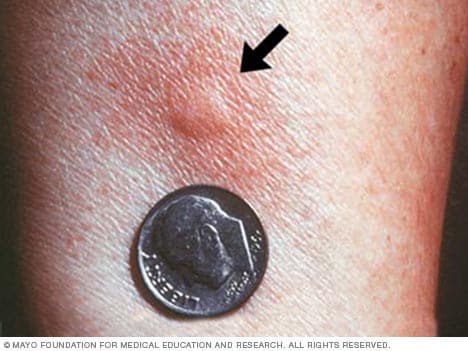Diagnosis
Positive reaction to allergy test

Positive reaction to allergy test
A small area of swelling with surrounding redness is typical of a positive allergy skin test.
To find out if you have shellfish allergy, your health care provider will ask about your symptoms and do a physical exam to find or rule out other medical problems.
A history of allergic reactions shortly after exposure to shellfish can be a sign of shellfish allergy. But the symptoms could also be caused by something else, such as food poisoning.
Allergy testing is the only sure way to tell what's causing your symptoms, so your provider may recommend one or both of these tests:
- Skin prick test. Small amounts of the proteins found in shellfish are pricked into skin on your arm or upper back. You're then watched for an allergic reaction. If you're allergic, you'll develop a raised bump (hive) at the test site on your skin. This typically takes about 15 to 20 minutes. Allergy specialists usually are best equipped to perform allergy skin tests.
- Blood test. A blood sample is sent to a lab to measure your immune system's response to a specific allergen. This test measures your immune system's response to shellfish proteins by measuring the amount of allergy-causing antibodies in your bloodstream, known as immunoglobulin E (IgE) antibodies.
Medically supervised food challenges can be performed if the diagnosis still isn't clear after allergy testing.
Treatment
The only sure way to prevent an allergic reaction to shellfish is to avoid shellfish. But despite your best efforts, you may come into contact with shellfish.
If you have a severe allergic reaction to shellfish (anaphylaxis), you'll likely need an emergency injection of epinephrine (adrenaline). If you're at risk of anaphylaxis to shellfish, your health care provider can give you a prescription in advance and explain how and when to give the injection. Regularly check the expiration date on the packaging to make sure it's current.
Carry injectable epinephrine (Auvi-Q, EpiPen, others) with you at all times. Epinephrine is typically given at the first sign of an allergic reaction. A second dose may be needed if symptoms recur. After you use epinephrine, seek emergency medical care, even if you start to feel better.
Clinical trials
Explore Mayo Clinic studies testing new treatments, interventions and tests as a means to prevent, detect, treat or manage this condition.
Preparing for your appointment
You're likely to start by seeing your family health care provider. Or you may be referred directly to an allergy specialist.
What you can do
Prepare for your appointment by making a list of:
- Symptoms, including any that may seem unrelated to an allergy
- Family history of allergies and asthma, including specific types of allergies if you know them
- Medications, vitamins, herbs or other supplements you're taking, and the dosages
- Questions to ask your health care provider
Questions related to shellfish allergy include:
- Are my symptoms most likely due to an allergy?
- Will I need any allergy tests?
- Should I see an allergist?
- Do I need to carry epinephrine?
- Are there brochures or other educational materials I can have? What websites do you recommend?
Don't hesitate to ask other questions, as well.
What to expect from your doctor
Your health care provider may ask you questions, such as:
- What symptoms are you having? How severe are they?
- When did you notice your symptoms?
- Have you reacted to shellfish in the past?
- What kind of shellfish did you eat?
- How soon after eating shellfish did your symptoms occur?
- What other foods did you eat during your meal? Don't forget sauces, beverages and side dishes.
- Did others who dined with you have similar symptoms?
- Is there a history of allergy in your family?
- Do you have other allergies, such as hay fever?
- Do you have asthma or eczema (atopic dermatitis)?
What you can do in the meantime
Avoid eating or touching any type of shellfish while waiting for your appointment.
Aug. 05, 2022